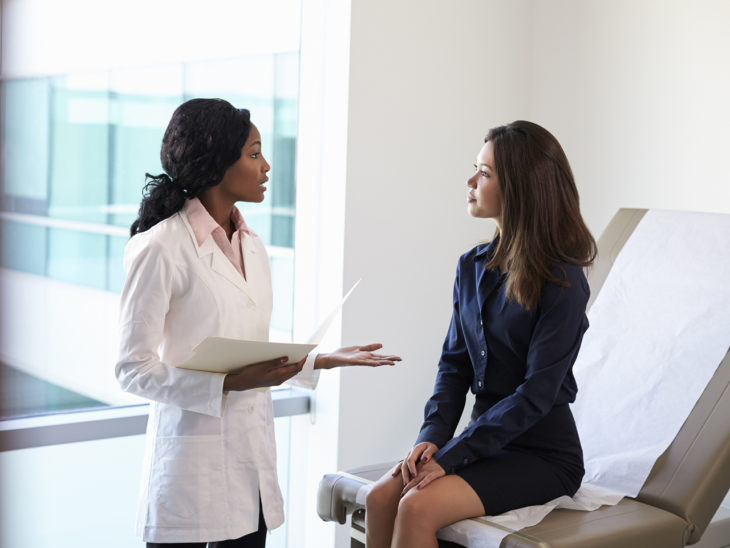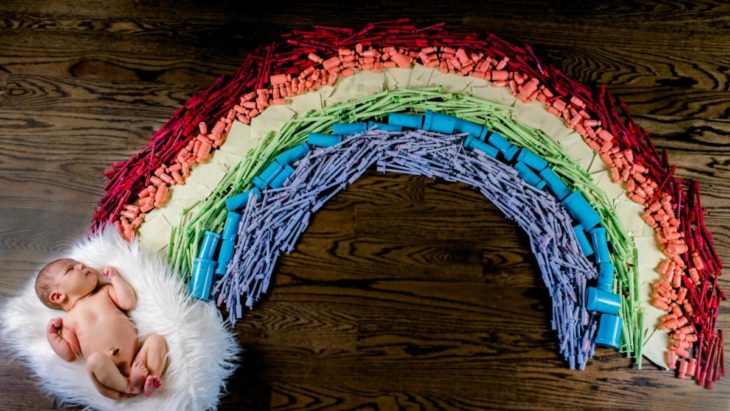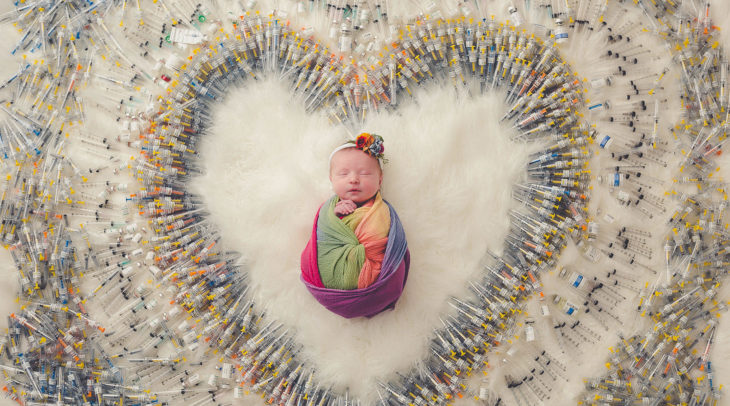I was never that woman who dreamt of having many children or starting my own “Brady Bunch.” Babies, little booties, and bottles were always an afterthought to enjoying a successful career, one peppered with travelling the world and enjoying a range of other adult activities a childless, flexible lifestyle could provide. However, after my husband Jason was diagnosed with leukemia and underwent a bone marrow transplant, it would be an understatement to say that my priorities and narrow definition of family underwent a fundamental revolution. One year post-cancer, I began to dwell on the thought of living and dying without a family of my own.
Cancer had forced mortality to become an issue that often occupied my thoughts during sleepless nights or long car rides, and in my worst nightmare, I became the modern antagonist of some sort of widowed cat lady fairy tale. I imagined myself an old hag with cracked skin in a big castle, hoarding treasure and cackling wildly all by myself, full of bitterness and regret over my own solitude. The adult lifestyle that once felt so plush suddenly transformed into a thorny horror story, and Jason and I decided to try IVF.
The full-body irradiation and seemingly endless months of chemotherapy Jason endured to battle leukaemia inevitably rendered him infertile. It was so obvious that he was shooting blanks that the fertility doctor laughed when we asked if he should be tested, just to check. Before his treatment, we were lucky enough to store some of his most prized swimmers, a gift that many facing cancer do not possess the means or time to do.
Even though it seems that the decision to pursue IVF was a decisive one, it was probably the most soul-searching matter I have ever encountered. In the months leading up to our first meeting with a fertility doctor, I wrestled with the notion that he would take one glance at our file, scrunch his face, and politely throw us out of his office. Although Jason had been in remission for almost eight months, his leukaemia was a notorious one and could return without warning to transform me into a 27-year-old widow. Aside from the fact that we were still financially and emotionally repairing our lives from the devastation cancer caused, I had mistakenly watched a documentary on UK surrogates. One boldly stated how she would never be a surrogate for a couple facing cancer. Who would give a baby – give life – to someone who would die? she said. Who could be so selfish to knowingly make a child fatherless? she said.
I would, I thought. And no wonder you hate people like me.

Source: todaysparent
Jason subscribed to the negativity for awhile as well. He felt that only a narcissist would conceive, ensuring that his DNA continued to proudly roam the earth after death. The thought of consciously, almost intentionally leaving me a single mother with a baby – or pregnant – should he pass away obviously unsettled him. After a few drinks one night, he confessed that he was petrified of passing away without ever seeing his child. More importantly, he grappled with his infertility in a silent, pensive manner, allowing me to see glimmers of a shamed man when he was feeling especially vulnerable. Many forget that the strength, health, and even sexiness of men are subconsciously intertwined with impressions of virility, stamina, and fertility. Jason simply felt he was a broken man, as though he was once a Greek god stripped of his supremacy. He was ashamed he couldn’t provide me with one of the simplest and most natural miracles in life – a baby.
I, too, often mourned the loss of our collective fertility as husband and wife. Like many couples, we never thought in a million years that we would be forced into IVF in our 20s. I felt as though family and friends just didn’t get it; they were quick to reassure us that at least IVF was an option: Science has come so far, can you believe it! Although I agreed with that statements, I also felt that no one ever acknowledged the loss of our baby-making abilities. We would never know what it was like to conceive naturally, to make love under the anticipation that we might be creating life. I felt robbed of an experience that rivaled most on my bucket list, resentful that a series of hormone injections and invasive procedures with cold doctor’s hands could even occupy the same arena.
A childhood friend from my hometown became a voice of reason during my internal debate. After recently having a baby of her own, I asked her if she would have made the same decision if she faced my uncertain future. She immediately barked, “Yes! Of course!” down the telephone. She was the only person who reassured me that I wasn’t being selfish, that yearning for a family of my own and a part of my husband was a natural feeling, even instinctual. It was around this time that I decided to stop worrying about what others thought and do what was right for Jason and me. If anyone knew that life was too short for regrets, it was us. The prospective joy of starting a family far outweighed my fear of becoming a single mother.
So began the quest for baby. Our fertility doctor recommended IVF with ICSI, concerned that simpler attempts, such as insemination, could possibly exhaust our limited supply of Jason’s army. My initial ultrasound revealed that I was Fertile Myrtle; I was intrigued by the black-and-white bulging ovaries on the screen harbouring little pinpricks of follicles ripe for egg-picking. Although this seemed like a blessing, my doctor warned that I was a high-risk patient for Ovarian Hyper Stimulation Syndrome (OHSS), a severe side effect of hormone drugs that could land me in hospital. I shrugged off any worry, not realizing the ominous foreshadowing of his caution.
IVF with ICSI was a heavy financial burden, even with the amazing refunds from Australia’s Medicare. As a result, I planned and prepared myself diligently, crossing my fingers that it would work the first time. I poured over every study, scrutinized all types of wacky products advertised on the Internet, and weighed every piece of advice I could collect from infertility forums. I wrote down an encyclopaedia of ridiculous questions for my doctor and counselor who was assigned to us when the process began. I attended weekly sessions of IVF acupuncture, swallowed an impressive regimen of vitamins, and much to my discontent, decreased my exercise routine from vigorous to light. I was dedicated to crafting the most comfortable wonderland of a uterus any embryo had ever seen.

Source: parents
Although the physical maintenance leading up to IVF became regular and habitual, the emotional component was a wild beast of its own. Even before I started the hormone drugs and injections, I unearthed an inert nervousness and fragility when mulling over my IVF expectations. Jason became incredibly supportive and attentive, sensing that my long silences bordering on despondence signalled that I required extra cuddles and deep and meaningful conversations more than usual. What bothered me the most at this point was the taboo nature of infertility, the reluctance of many to openly acknowledge and speak about infertility problems and find support. I knew from visits to our fertility doctor that no couple was immune to reproductive assistance. Every week we joined an office bursting with young couples, old couples, gay couples, and single women representing a cross section of ethnicities, lifestyles, and personal stories. Yet, no one talks about it. Ever. Issues of fertility are fraught with shame and failure, so much so that its inevitable emotional turmoil is rarely acknowledged even amongst families, banishing most to anonymous chat rooms, websites, and forums.
Although I skimmed these resources for tips, much of the jargon and shorthand was indecipherable. I was exhausted by translating an amalgamation of hieroglyphics and dates regarding procedures, pregnancies, and miscarriages suffered by notice board members. Frustrated that I failed to comprehend a language implicit to my newfound sub-culture without an IVF dictionary (BFP? FET? IUI? BFN? Er, what?), Jason and I began to reveal our IVF plans to a select group of family and friends, ones that understood us and could offer a listening ear. Surprisingly, I found that some of my friends had endured their own fertility battles; they were just too embarrassed to speak about it.
Although I remained hopeful that the drugs weren’t as harsh as I imagined, the side effects were brutal. I was particularly sensitive to both a nasal spray that induced a post-menopausal state and daily follicle-stimulating injections. Within two weeks, my bloated lower abdomen could easily be mistaken for a real second trimester pregnancy and I felt as though my ovaries were suspended like a puppet by a thin string, bobbing up and down painfully when I sat or stood too quickly or bent over. The endless backaches, headaches, mood swings, and general irritability were unrelenting. I wanted to punch one of the IVF nurses in the mouth when she told me I shouldn’t be experiencing such drastic side effects and I was probably exaggerating.
My “exaggerations” transformed from annoying to serious a few days before my scheduled egg retrieval. I knew something wasn’t right when my fertility doctor only said, “Shit!” when his probe exposed approximately 20 – yes, 20 – burgeoning follicles crowded in clusters on my ovaries. The normal person undergoing IVF produces eight to ten eggs.
It was clear that I was “overstimulated,” but my doctor was optimistic and instructed Jason and I to continue with the final “trigger” injection before the egg collection. If I ate loads of protein, drank three liters of water a day, and abided by some strict R&R, I could still ward off OHSS.

Source: babble
Despite drastically dropping the dose on the follicle-stimulating injections, my discomfort reached epic proportions the day before egg retrieval. I couldn’t wait to go into day surgery and have the suckers removed. I was actually elated when I awoke from the 20-minute procedure; the pain was minimal, Jason was waiting for me with a sandwich and a coffee, and my doctor had retrieved 23 eggs, a behemoth amount for any female to produce. I naively thought the worst was over as I recovered at home, allowing Jason to pamper me with tea and dinner in front of the television.
My optimism over possibly conquering OHSS was shattered when my stomach ballooned full of fluid the next day, so much so that I had difficulty breathing. I knew something was really wrong when Jason took one look at me and called my fertility doctor with an uneasy expression in his eyes, one hidden behind soothing reassurances. I was ordered to go straight to the emergency room. Jason practically had to drag me to the hospital kicking and screaming — not because I was having an adult temper tantrum, but because hospitalization for OHSS meant I would be unable to complete the IVF cycle with an embryo transfer which could ultimately lead to a successful pregnancy in two weeks time. If the transfer was successful and I was suffering severe OHSS, a pregnancy could exacerbate my condition further.
I was devastated. Months of IVF groundwork were annihilated, destroyed in an instant by severe OHSS. Although moderate OHSS is common, severe OHSS requiring hospitalization occurs in two percent of women. I became just another one of those random, rare statistics.
In the hospital, the fluid congregating on my abdomen swelled to almost 30 pounds over the course of three days. The pain on my stomach and back prevented me from walking, and I sat in my hospital bed like a cartoon Humpty Dumpty, only with a catheter. Unable to control the unbearable pain, I buzzed my nurses for morphine injections every three hours until my doctors ordered twice daily Oxycontin, which barely put a dent in the torture. Just as sensitive to pain medication as I was to hormone drugs, I often vomited on an empty stomach after begging for analgesics despite taking anti-emetics regularly. This was particularly entertaining considering I couldn’t even sit up anymore, so I tended to vomit all over myself while Jason fruitlessly tried to catch vomit in a sick bag.
Despite all this, I knew what to expect of hospital from Jason’s countless visits and went with the flow. I never protested the endless poking and prodding and always thanked my nurses and doctors, even if I only managed to spit out pleasantries in a drug-induced slur. In retrospect, I think I knew severe OHSS was inevitable in my case. In the few instances I was awake, usually when the nurses tried to quietly take my vitals or Jason ran his fingers through my hair out of pity, I considered that maybe the universe didn’t want me pregnant. Maybe I was destined to fulfill my nightmare fairytale. Maybe my lonely castle palace was imminent and this was just a rest-stop on the way.

Source: thebump
I knew my case was extreme by the somber, empathic glances of my nurses, which was confirmed when I overheard my doctors quietly debating whether or not to relocate me to the ICU. By the fifth or sixth day, my breathing was severely limited. One evening, a handsome, energetic doctor crept into my room in the dead of the night. I honestly thought my impressive roster of medications was causing some sort of sexy doctor hallucination. I snapped back to reality when he gingerly explained that my heart rate was a bit “tachy” and I was scheduled for an emergency x-ray. The results revealed that part of my lung collapsed and I had multiple plural effusions, which is fancy doctor language for “fluid in my lungs,” or layman’s terms for “stuff is really, really bad now.” A senior doctor on my case paged a special radiologist on call to surgically implant a tap in my stomach to help drain the fluid. My doctor must have been cashing in a favour because it was the weekend and I knew from Jason’s hospital tenure that nothing productive was ever accomplished on a Saturday or Sunday. Over a two-day period, the nurses used the tap to drain over six liters of blood-tinged fluid. I immediately felt enormous relief on my belly, and I welcomed it graciously. I could see the light at the end of the tunnel.
Over the next two weeks, the fluid slowly dropped from my waistline and I was able to leave hospital. My last ultrasound revealed that my ovaries had swollen to 10 and a half centimetres each, which earned me second place in the worst cases of severe OHSS the hospital had ever seen. I scuffled around the house in Jason’s T-shirts and maxi dresses, as I still looked six months pregnant. It would take a long time for my body to return to normal and for my hormones to stabilize, and I would continue blood-thinning injections (ironically, the same ones I used to give Jason) and aspirin at home.
Despite regaining energy, lung-capacity, and my appetite by bounds and leaps (and even sheepishly returning to the gym), the emotional toll caught up with me. Although recovery served as a distraction in hospital and I enjoyed telling jokes with my nurses over my rotund midsection, grief plagued me in the stillness at home. I was depressed that after all my pain and suffering, I had no pregnancy and was waiting indefinitely to start another modified IVF cycle sans the drugs that caused the OHSS. I was one tough cookie, but after a year defined by cancer and now our fertility challenges, I had reached my breaking point. I felt as though I could cry endlessly over a lost pregnancy I never really had to lose in the first place. Although Jason reminded me that the lab had fertilized and frozen eight embryos – eight potential babies – it still proved difficult to consider the glass half full, even though I recognized how lucky we were.
So here I am, approximately two weeks free from the hospital. I would be lying if I didn’t say the whole ordeal has still left me feeling delicate. I continue to hide an awkward bulge under oversized clothing and curse my hormones for making me overly emotional and crave odd food at weird hours. I finally understand how taxing this experience is for every optimistic couple that prays and tries tirelessly to fall pregnant with no luck. No wonder so many conceal their experiences, unwilling to speak about it: not because it’s taboo but simply because it just hurts too much.
Our dream for baby is still alive, and I wait hopefully yet guardedly for our follow-up appointment with our fertility doctor. Will I end up pregnant or does fate have a different plan for Jason and me? I honestly can’t say. While the story continues to be written, I am glad that I could share it and hope I haven’t sworn anyone off reproductive assistance.
Original by:
